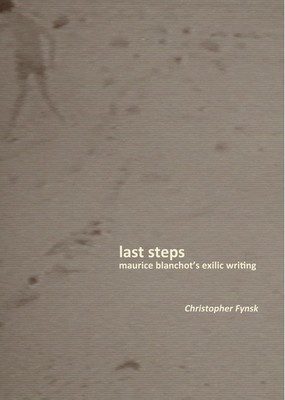
- We will send in 10–14 business days.
- Author: Christopher Fynsk
- Publisher: Fordham University Press
- ISBN-10: 0823251020
- ISBN-13: 9780823251025
- Format: 16 x 22.9 x 2.5 cm, hardcover
- Language: English
- SAVE -10% with code: EXTRA
Reviews
Description
Writing, Maurice Blanchot taught us, is not something that is in one's power. It is, rather, a search for a non-power that refuses mastery, order, and all established authority. For Blanchot, this search was guided by an enigmatic exigency, an arresting rupture, and a promise of justice that required endless contestation of every usurping authority, an endless going out toward the other.
"The step/not beyond" ("le pas au-delà ") names this exilic passage as it took form in his influential later work, but not as a theme or concept, since its "step" requires a transgression of discursive limits and any grasp afforded by the labor of the negative. Thus, to follow "the step/not beyond" is to follow a kind of event in writing, to enter a movement that is never quite captured in any defining or narrating account. Last Steps attempts a practice of reading that honors the exilic exigency even as it risks drawing Blanchot's reflective writings and fragmentary narratives into the articulation of a reading. It brings to the fore Blanchot's exceptional contributions to contemporary thought on the ethico-political relation, language, and the experience of human finitude. It offers the most sustained interpretation of The Step Not Beyond available, with attentive readings of a number of major texts, as well as chapters on Levinas and Blanchot's relation to Judaism. Its trajectory of reading limns the meaning of a question from The Infinite Conversation that implies an opening and a singular affirmation rather than a closure: "How had he come to will the interruption of the discourse?"EXTRA 10 % discount with code: EXTRA
The promotion ends in 17d.02:59:13
The discount code is valid when purchasing from 10 €. Discounts do not stack.
- Author: Christopher Fynsk
- Publisher: Fordham University Press
- ISBN-10: 0823251020
- ISBN-13: 9780823251025
- Format: 16 x 22.9 x 2.5 cm, hardcover
- Language: English English
Writing, Maurice Blanchot taught us, is not something that is in one's power. It is, rather, a search for a non-power that refuses mastery, order, and all established authority. For Blanchot, this search was guided by an enigmatic exigency, an arresting rupture, and a promise of justice that required endless contestation of every usurping authority, an endless going out toward the other.
"The step/not beyond" ("le pas au-delà ") names this exilic passage as it took form in his influential later work, but not as a theme or concept, since its "step" requires a transgression of discursive limits and any grasp afforded by the labor of the negative. Thus, to follow "the step/not beyond" is to follow a kind of event in writing, to enter a movement that is never quite captured in any defining or narrating account. Last Steps attempts a practice of reading that honors the exilic exigency even as it risks drawing Blanchot's reflective writings and fragmentary narratives into the articulation of a reading. It brings to the fore Blanchot's exceptional contributions to contemporary thought on the ethico-political relation, language, and the experience of human finitude. It offers the most sustained interpretation of The Step Not Beyond available, with attentive readings of a number of major texts, as well as chapters on Levinas and Blanchot's relation to Judaism. Its trajectory of reading limns the meaning of a question from The Infinite Conversation that implies an opening and a singular affirmation rather than a closure: "How had he come to will the interruption of the discourse?"

Reviews